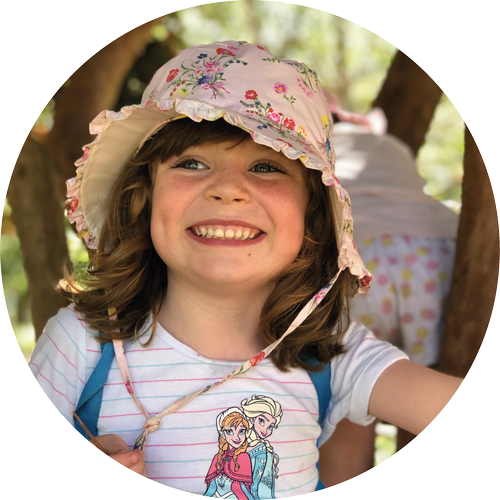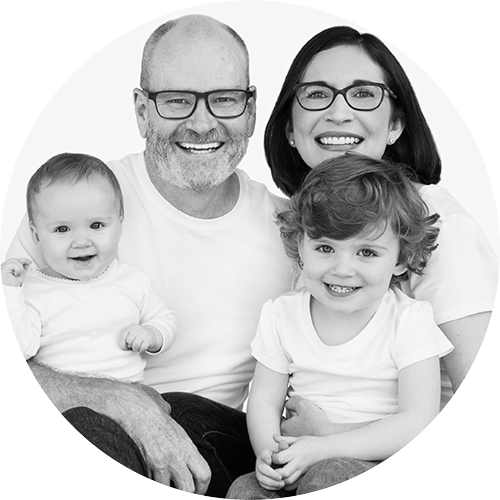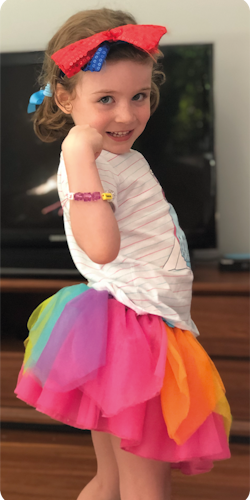One big happy family
In October 2014, Melanie and Colin welcomed beautiful baby Emily into the world. Paired with her infectious smile and ‘unruly’ brunette curls, she stole the hearts of everyone who met her.
Just two years later, Lucy was born. Their family, also consisting of Colin’s two children from a previous marriage, was finally complete and life couldn’t be better.
Colin’s diagnosis
In 2017, life for the family turned upside down when Colin received the devastating news that he had advanced metastatic bowel cancer. Just a year after his diagnosis, there were complications with Colin’s treatment, and he passed away days before Christmas. The children lost a future with their dad, Emily, 3 years old at the time and Lucy, just 1 year old.
The ‘new normal’
It took a long time for the Page family to readjust to life without Colin. Things eventually started looking up for the family. Emily had started school where she learnt she loved to sing, dance and draw as well as making friends which she did with ease. Emily also adored being a big sister to Lucy, whom she had become especially close with since the passing of their dad.
In September 2021, Emily started to show some strange symptoms. Emily developed high fevers and extreme lethargy. The usual everyday activities that were once loved by the then 6-year-old, such as swimming, became a chore as Emily didn’t have the energy to keep up with the other children.
"I thought she was experiencing some post-viral malaise. I thought about taking her to the GP but thought I was overreacting. During the school holidays, she was sleeping a little longer and whilst still trying hard to engage in play, her heart just didn’t seem to be in it."
- Melanie
Melanie then noticed bruising on Emily’s limbs, larger and darker than regular playground bruises. Emily also started to complain about sore knees and after she came home from school claiming she’s had a nosebleed Melanie was quick to call the family doctor to get Emily checked out.
Melanie knew something was wrong but wasn’t expecting the worst, she decided to get Emily seen as soon as possible. Melanie took her daughter to a pathology collection centre and requested some blood tests.
A few nights later, while the girls were sleeping, the phone rang and Melanie answered. The results came back, Emily had critically low haemoglobin, white cells and platelets and blast cells consistent with Acute Lymphoblastic Leukaemia, also known as ALL.
“I hung up and was absolutely beside myself. I collapsed to the floor. I was hyperventilating. Stefan, alarmed, just held me as I wailed “my baby has cancer”. My mind was swirling, I was shaking and couldn’t work out what to do next. As an emergency physician, I am always calm, considered and articulate even in the most traumatic of circumstances, but suddenly I couldn’t string a logical thought together.”
- Melanie
Acute Lymphoblastic Leukaemia
Emily was rushed into the hospital and immediately taken into the care of the doctors. They confirmed she had a high fever and critically low white cells and that her platelets, which help form blood clots to stop bleeding, were also extremely low and she was at risk of a life-threatening haemorrhage.
It was confirmed the next day that Emily had B cell Acute Lymphoblastic Leukaemia.
Acute Lymphoblastic Leukaemia starts in the bone marrow, making it hard for new B cells to form. This, in turn, affects the immune system as the B cells protect you from infections. Emily was given chemotherapy straight away. She also had to take a high dose of steroids and her life relied on daily transfusions of red blood cells and platelets.
Over the next 9 days, Emily endured a bone marrow biopsy, a lumbar puncture (also known as a spinal tap), hydration therapy, multiple blood transfusions/donations and other painful and invasive procedures.
The impact that this time had on Emily’s mental state was immeasurable. Melanie saw the spark leave her daughter's spirit as she could barely eat, sleep or talk during this time.
“She became profoundly depressed. She stopped talking and didn’t interact with anyone. At times she wasn’t even interested in watching tv. She whimpered during her sleep. Sleep was also disturbed by the steroids and the ‘hyper-hydration therapy’ she was receiving.”
- Melanie
Repercussions of cancer treatment
Emily was discharged from the hospital on her 7th birthday and although excited to be home, she wasn’t out of the woods yet. Melanie had to take her to countless chemotherapy sessions and Emily also had to experience the consequences of taking such a high dose of steroids.
Emily developed Cushing’s Syndrome, a hormone disorder that is caused by steroids and certain types of cancer treatments. This caused her to gain weight and lose muscle, making life even harder for the 7-year-old.
“She developed a moon-shaped face and pot belly. Her limbs became atrophic and spindly. She lost all muscle power and could no longer climb stairs or walk any further than the bathroom. She had trouble standing up from the toilet as she had no power in her leg muscles.”
- Melanie
Despite this dramatic change in appearance, the most distressing thing for Melanie was Emily’s deep depression. She went from a happy-go-lucky child, who loved making everybody smile, to a shell of herself who didn’t want to play or talk to anyone. Within three gruelling weeks of chemotherapy, Emily started to lose her brunette curls and the impact of seeing her baby’s hair fall out also caused Melanie’s hair to shed due to stress.
Where is Emily now?
After a long month of induction therapy, Emily had another bone marrow biopsy that showed she was now in remission, meaning that there were no cancer cells detected.
Emily’s steroid treatment has also stopped for now and Melanie has started to see a glimpse of her daughter’s sparkle return. The courageous little girl even went to visit her school for the first time in months. Emily was excited to see her friends again despite being asked a few times by some children why she looked different. For many, this would have disheartened and discouraged them, but it’s made Emily more resilient. She’s currently back at school with her friends two days a week and is loving every second.
Funding vital research to help children like Emily.
Thankfully there are some incredible researchers out there and at Cure Cancer, we are dedicated to life-saving research and finding a cure. Dr Laurence Cheung had made some incredible leaps into the field of Acute Lymphoblastic Leukemia (ALL) and the funds raised from Cure Cancer’s BarbeCURE campaign this year will support him in his research to help children like Emily.




